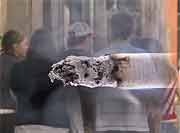
WEDNESDAY, Sept. 1 (HealthDay News) — Secondhand smoke appears to trigger a complex inflammatory response in the lungs, a study in rats reveals.
The researchers exposed the animals to secondhand smoke five times per week for two or four months. The exposures occurred in two three-hour shifts twice a day, separated by a two-hour break.
“This is much like what a human would be exposed to at a bar or casino,” Adelheid Kratzer, an investigator in the pulmonary and critical care division in the department of medicine at the University of Colorado-Denver, said in an American Physiological Society news release.
Two months of exposure to secondhand smoke was enough to cause significant changes in the rats’ lungs, and those changes were even more notable after four months.
Among the changes the investigators found were:
- Enlargement in the alveolar air space of the lungs, which suggests the alveolar structure had started to break down, similar to the way it does in early emphysema. The alveoli are tiny sacs where the oxygen-carbon dioxide exchange occurs during breathing.
- Increased numbers of white blood cells called macrophages in the alveolar space, indicating an immune system response.
- Elevated levels of the cytokine interleukin-18, which is produced by macrophages and is associated with strong inflammatory responses and tissue destruction.
- Inhibited growth and spread of endothelial cells lining the inside of small blood vessels of the lungs. A decrease in endothelial cells can reduce the elasticity of the blood vessel wall and increase its permeability, which can lead to chronic inflammation that’s seen in patients with chronic obstructive pulmonary diseases, such as emphysema and chronic bronchitis.
The findings, presented at the American Physiological Society conference held last week in Westminster, Colo., may help efforts to develop new ways to treat lung damage caused by secondhand smoke, the researchers said.
More information
The U.S. Centers for Disease Control and Prevention has more about the health effects of secondhand smoke.

